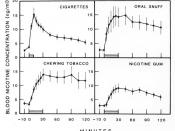Some drugs are tolerated (nicotine and caffeine) and used by athletes. Smoking and chewing tobacco are common sources of nicotine, while persons with acute reactions to caffeine can be influenced through "acceptable" levels of associated drink and food ingestion. These drugs have an effect upon performance.
Addiction results in two basic extremes of metabolism, one in the presence of the drug, the other in its absence. When the dependency habit occurs independent of training times, applications to training are exposed to a shifting basic metabolism. That means that the body's reaction to training is more complicated and inconsistent. That contrasts to when there is no dependency and a constant metabolism exists.
The result of this added complication is that responses to training are more varied than necessary. The strengths of established adaptations are diluted because they are many more than the simple few. That variation and reduction in training trials/exposures means that fine motor skills are less refined and any direction toward perfection is retarded.
These states have a great effect on skilled performance. Accuracy is reduced and inconsistency increased. Energy dependent activities are particularly affected in an adverse manner. As fatigue occurs in all activities, performance degradation will occur more rapidly because of the initially weakened conditioned strengths of skill habits and the greater number of options for alternative responses.
In team situations it is irresponsible to reduce performance through a "habit" when others are trying to maximize theirs. When some rely on others to perform well for them to perform well, the habit then becomes socially unacceptable.
At the highest performance levels, only a slight minor shift in accuracy skills can have grave consequences. Since habits concerning nicotine are particularly prevalent in the professional sports of football and baseball, one is set to wondering how much performances could...


